101 Basic Korean Words for Travel in South Korea
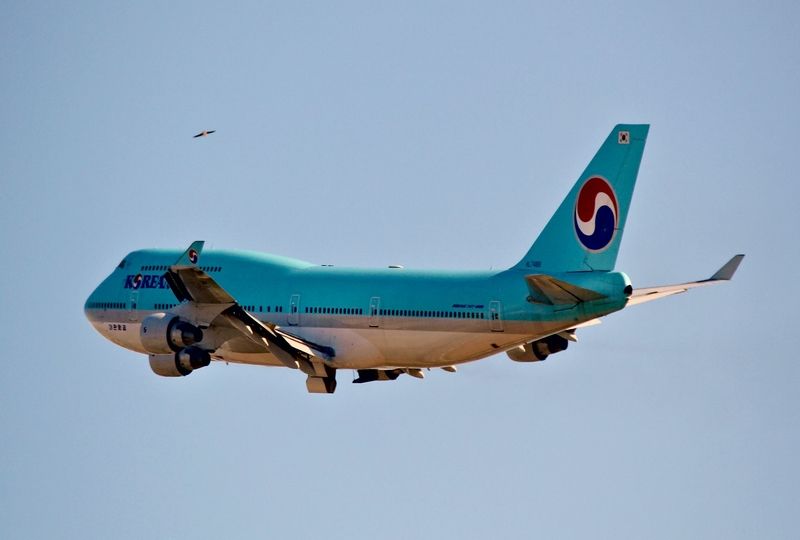
When you visit South Korea, you'll find that English is quite common in big international cities like Seoul or Busan. English academies and immersion schools have been flourishing for decades, so it's safe to say you'll be able to get by without speaking much Korean.
However, if you want to explore more of the Korean peninsula (and trust me, you definitely do), be sure to practice a few basic traveling phrases in Korean. Not only will knowing some Korean phrases help you avoid an awkward situation -like sitting in someone's reserved seat or ordering squid as snack- but it will also impress the locals. Korean people will definitely appreciate your attempt to communicate in their language. If you know some basic traveling phrases, it shows respect for Korean culture.
So, whether you're planning to take a trip to South Korea or even if you're just curious about Korean culture, use our list of 101 basic Korean phrases to improve you Korean speaking and listening skills.
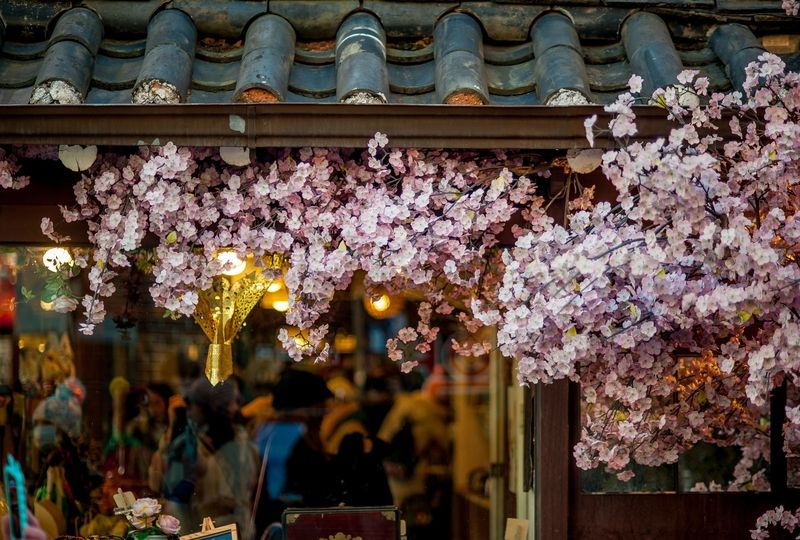
Why Visit South Korea?
Most people don't immediately think of South Korea when planning a trip to Asia. Isntead, they opt for the more popular beaches of Thailand and the rolling rice hills in Vietnam.
But guess what. Korea has both of these things, and more. South Korea is truly a unique country to visit, and it has something to offer for every tourist's preference.
Although small in land area, the country is rich in regional and geographical diversity. Surrounded by the sea on three sides, South Korea has miles of beautiful beaches. Hiking more your thing? Then Korea is the perfect place to go. Over 70% of South Korea is covered in mountains, so you won't miss out on the beautiful nature.
If you're not really a nature person, don't worry. You'll be captivated by Korean culture and history. After all, Korea is home to 11 Unesco World Heritage sites, including temples and fortresses from ancient dynasties. You can also spend hours shopping, or my personal favorite: indulge in delicious Korean delicacies that vary across the country.
Have I enticed you to visit South Korea yet? Even if you can't take a trip overseas soon, learning Korean travel phrases will help expand your Korean vocabulary and prepare you for any future travels.
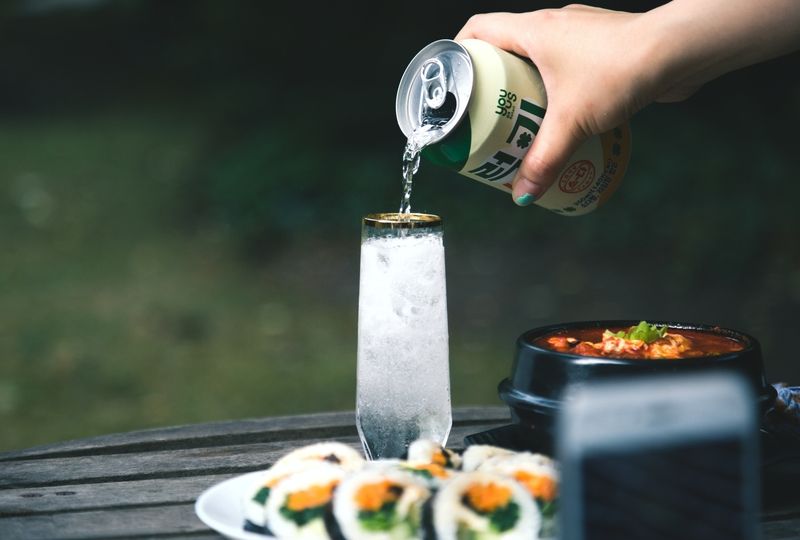
Basic Korean Phrases for South Korea Travel
It's important to note that Koreans use different verb conjugations depending on the person they are speaking to. The different conjugations imply various levels of respect and politeness. For the purpose of traveling in Korea, it's okay to use either the formal or polite form of the verb, and that's what will be included on this list. Koreans won't expect foreingers to understand the sublte nuances of Korean honorifics, so just being polite is the best way to go.
Also, you might notice several phrases are listed more than once. That's because unlike in English, Koreans have different variations of words and phrases for very specific situations.
Now, let's learn some basic Korean phrases for travel!
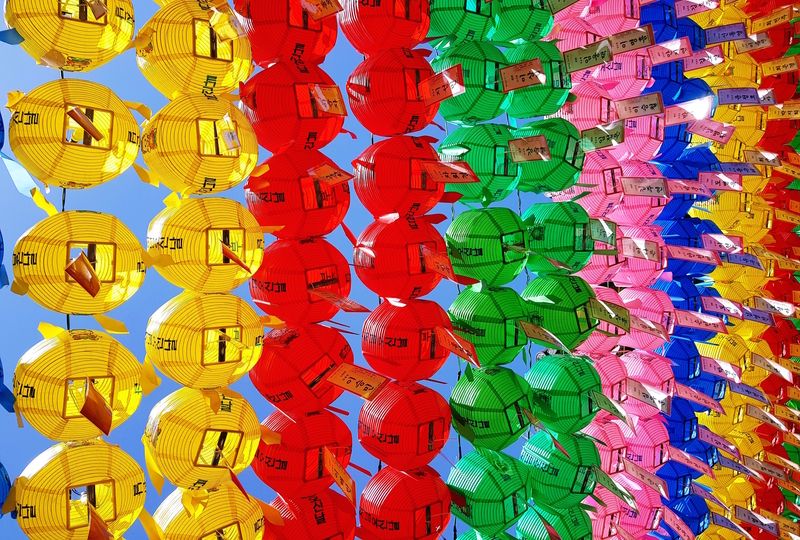
The Most Basic Korean Words You Must Know
- An-nyeong ha-se-yo (안녕하세요):Hello.
This is the most common way to greet someone at anytime of the day. You'll be greeted any time you enter a shop, restaurant, taxi- well anywhere, really. So you should learn how to say hello in response. - An-nyeong-hi ga-se-yo (안녕히 가세요): Goodbye.
This is the goodbye to use if someone else is leaving. "Ga-se-yo" means to go,so you are basically telling someone to go peacefully. - An-nyeong-hi gye-se-yo (안녕히 계세요): Goodbye.
This is the goodbye to use when YOU are leaving. There is a slight difference in the endings of the two goodbyes; however, don't worry too much if you don't remember the difference. You can always just say "an-nyeong." - Ne (네): Yes
- A-ni-yo (아니요): No
- A-ma-do (아마도): Maybe
- Mol-la-yo (몰라요): I don't know.
- Jam-shi-man-yo (잠시만요): Excuse me./Just a moment.
You can use this phrase to get the attention of others, for example if you need someone to move out of your way. You can also use this to mean "wait a minute." - Jeo-gi-yo (저기요): Excuse me.
Use this version of "excuse me" to get attention in a restaurant or business. - Sil-lye-hab-ni-da (실례합니다): Excuse me.
This version of excuse me is used to apologize, like if you accidentally bump into someone. - Mi-an-hab-ni-da (미안합니다): Sorry.
- Gam-sa-hab-ni-da(감사합니다): Thank you.
- Gwaen-chan-ayo(괜찮아요): It's alright/never mind/it's okay.
- Cheon-man-e-yo(천만에요): You're welcome/don't mention it.
- Shi (씨): Add this at the end of someone's name to be polite. It means Mr./Ms. regardless of gender or marital status.
- Eo-je (어제): Yesterday.
- Oh-neul (오늘): Today.
- Nae-il (내일): Tomorrow.
- Ji-guem (지금): Right now.
- Na-jung-eh (나중에): Later.
- Eol-ma-ye-yo?(얼마예요?): How much is it?
- I-geo ju-se-yo.(이거 주세요.): Give me this, please.
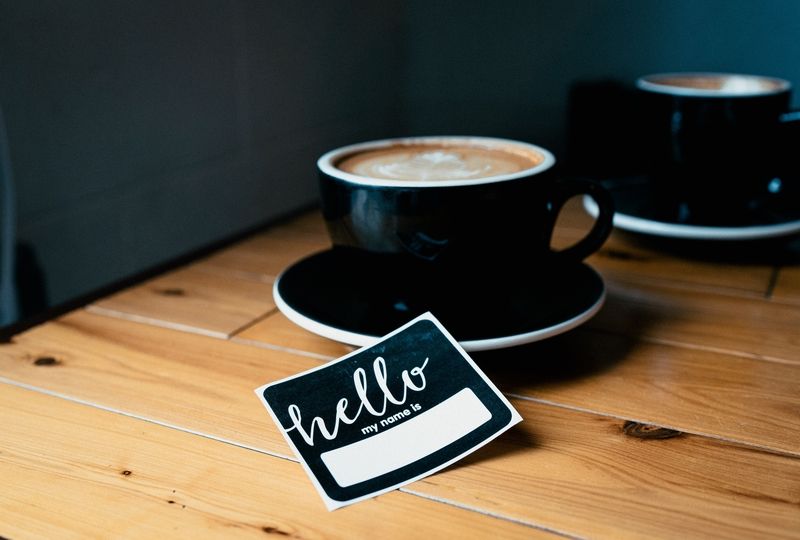
Introducing Yourself
- Ee-reum-ee mo-eh-yo(이름이 뭐에요?): What's your name?
- Je ileum-eun (your name)ibnida.(제 이름은 (your name)입니다.): My name is _________.
- Jeo-neun (country)e-seo wass-eo- yo. (저는 country에서 왔어요):: I'm from ____________. For a list of countries, click here.

Making Yourself Understood
Of course, if you are not Korean, you might stick out as a foreigner in smaller cities. Still, some locals might mistake you for a expat living in South korea and assume you can communicate well. Use these Korean phrases to make yourself understood.
- Han-guk-mal mot hae-yo.(한국말 못 해요.): I can't speak Korean.
- Han-guk-mal jo-geum mal hal su iss-eoyo. (한국말 조금 말 할 수 있어요.): I can speak a little Korean.
- I-hae mos hae-yo. (이해 못 해요): I don't understand.
- Cheon-cheon-hi mal-hae-jus-eyo. (천천히 말해주세요): Please speak slowly.
- Da-si han beon mal-hae-jus-eyo(다시 한 번 말해주세요.): Please say it again.
- Yeong-eo ha-se-yo? (영어 하세요?): Do you speak English?

Asking for Help
If you're traveling in a country that doesn't speak your language, there's probably going to be several times that you need to ask for help. Whether it's an emergency situation or you're just looking for a toilet (which, okay is also an emergency sometimes), here are basic Korean phrases to ask for help.
- Do-wa-ju-se-yo (도와주세요): Help me!
- Gyeong-chal-eul bul-eu-se-yo.(경찰을 부르세요): Call the police.
- Eung-geub sang-hwang-i-e-yo! (응급 상황이에요): It's an emergency.
- Ui-sa-ga pil-yo hae-yo. (의사가 필요 해요): I need a doctor.
- Gu-geub-cha-leul bul-leo ju-se-yo. (구급차를 불러 주세요): Call an ambulance.
- Ah-pa-yo. (아파요): I feel sick.
- Jil-mun-i is-seub-ni-da. (질문이 있습니다):: I have a question.
- Byeong-won (병원):: Hospital
- Gyeong-chal-seo (경찰서): Police station
- Yag-guk (약국): Pharmacy
- Eun-haeng (은행): Bank
- Hwa-jang-sil (화장실): Bathroom
- __eh ga-ya hay-yo ( __ 에 가야 해요): This sentence means, I have to go to the (place). So, you can, say "byeonh-won-eh ga-ya hay-yo," to mean "I have to go to the hospital.
- Eo-di-ye-yo? (어디예요?): Where is it? You can also add the place in front of the question. So, if you ask "Hwa-jang-sil eo-di-ye-yo?," you're asking where the bathroom is.
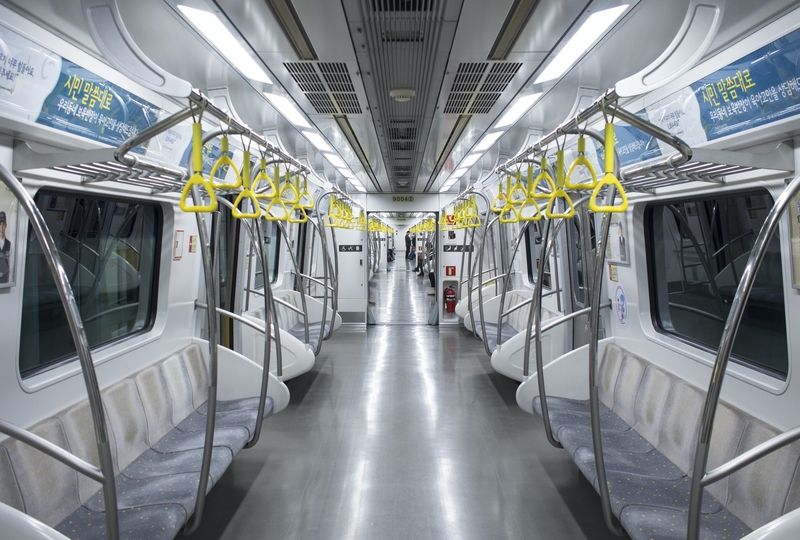
Transportaion
Lucky for travelers, getting around South Korea is cheap and easy. You can use applications on your phone for accurate bus times and maps. South Korea has a renowned public transportation system. It's clean, cheap, and efficient, so you can get from one end of the country to the other in no time at all. Although most travel hubs have some English, you still might need to use these phrases when getting around the country. Use the term "where" (#45) to make questiosn with some of these words.
- Beo-su(버스): Bus
- Beo-seu jeong-lyu-jang (버스 정류장): Bus stop
- I beo-seu (place) ga-na-yo?(이 버스 place name 가나요?): Does this bus go to ___ ?
- Da-eum beo-seu-neun eon-je iss-eo-yo?(다음 버스는 언제 있어요?): When is the next bus?
- Gi-cha(기차): Train. It's important to note here that the high speed train in Korea is called the KTX, so if you say "KTX," you will be understood.
- Ji-hae-chol (지하철): Subway
- Ji-hae-chol yeog (지하철역): Subway station
- Bi-haeng-gi (비행기): Airplane
- Gong-hang (공항): Airport
- Taek-si (택시): Taxi. For an easier way to hail a taxi, you can use this phone app.
- Seoull-yeoge ga-go si-peun-de-yo.(서울역에 가고 싶은데요.): I'd like to go to Seoul Station. Of course, if you're in a taxi, you can interchange any location with the word Seoul.
- Pyo (표): Ticket
- Bal-gwon-gi (발권기):: Ticketing machine
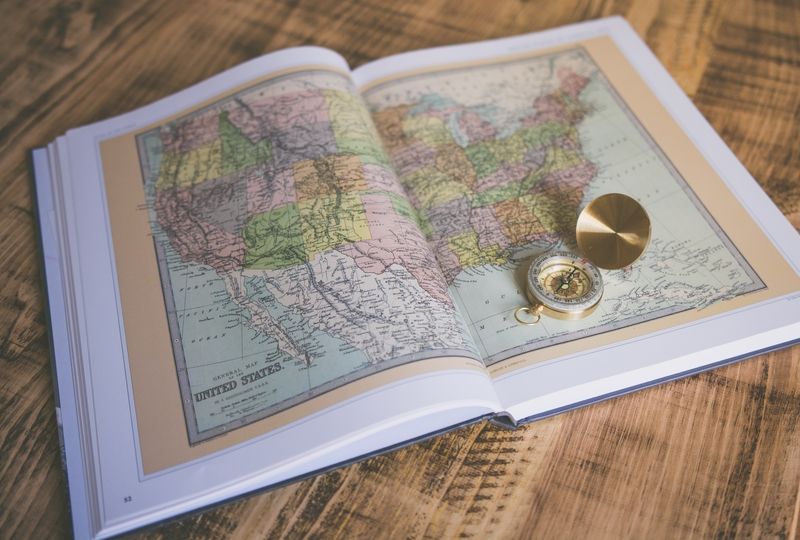
Directions
- Dong (동): East
- Seo (서): West
- Nam (남): South
- Buk (북): Buk
- Yeo-gi (여기): Here
- Geo-gi (거기): There
- Jeo-gi (저기): Over there
- O-leun-jjog-eulo ga-se-yo. (오른쪽으로 가세요): Turn right.
- Oen-jjog-eu-lo ga-se-yo. (왼쪽으로 가세요): Turn left.
- Jig-jin-ha-se-yo. (직진하세요.): Go straight.
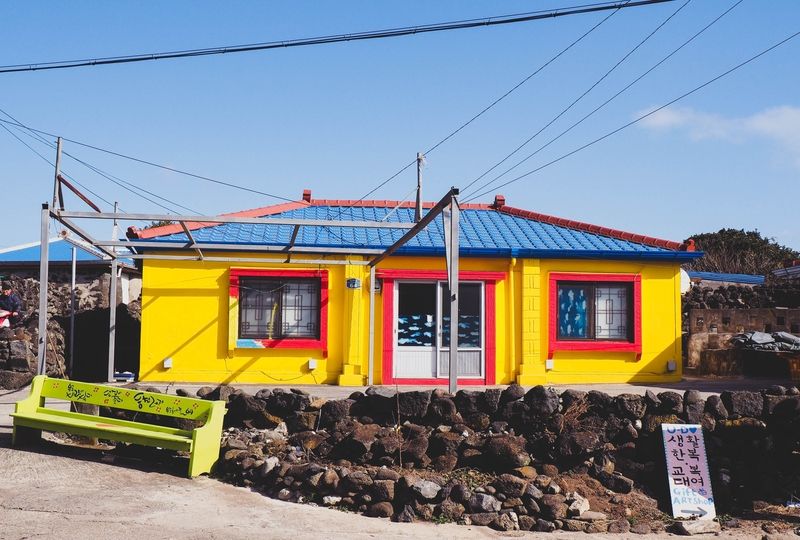
Accomodation
Although you can definitely find five star hotels in Korea, there are a number of more affordalbe - and more unique- options to look at while you travel around the country.
69. Sa-u-na (사우나): Sauna.
Did you know that you can sleep on the floor of a sauna? This is the cheapest place to stay, usually under 10,000 Korean won. You'll be given a mat on a warm floor.
70. Ho-seu-tel (호스텔): Hostel.
71. Min-bak (민박): Min-bak.
A minbak usually is a simple room with access to a kitchen and a private bathroom. They can range from anything like a motel to a room in the owners' house.
72. Mo-tel (모텔): Motel.
Motels in Korea are often themed and geard toward lovers, so if you go with this option, make sure you find one that's nice and clean.
73. Gue-su-tu Ha-oe-seu (게스트 하우스): Guesthouse.
74. Ho-tel (호텔): Hotel.
75. Pen-sion (펜션): Pension.
Pensions are like partially furnished houses or apartments that you can rent. They're affordable and usually quite beautiful, as most are in the countryside or in a scenic area.
76. Ri-jor-teu (리조트): Resort.
77. Bin-bang iss-eo-yo?(빈방 있어요?): Do you have any vacancies?
78. I-il mug-gess-eo-yo(이일 묵겠어요): I'm staying for two days.
In this case, the first syllable "i" is the number for 2. You can use other numbers if you plan to stay longer.
79. I in-yong chim-dae (이 인용 침대): A bed for two people.
80. Ye-yag-eul ha-go sip-eoyo. (예약을 하고 싶어요): I'd like to make a reservation.
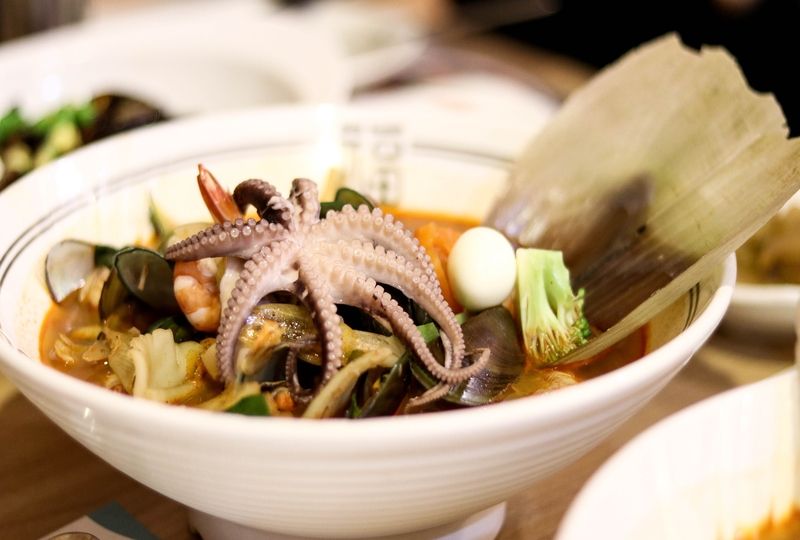
At the Cafe or Restaurant
- Bae-go-pa-yo. (배고파요): I'm hungry.
- Ka-deu bad-euse-yo? (카드 받으세요?): Do you accept cards?
A lot of Korean restaurants are still cash only, so it's best to carry some Korean money or check before ordering. If you forget, don't worry. There are ATM's on almost every street - Ttalo-ttalo gye-san-hal-ge-yo. (따로따로 계산할게요): Please split the bill.
Most Koreans share the meal and one person pays the bill. Again, it's best to carry cash so you and your companions can all contribute if necessary. - Po-jang-hae jus-e-yo. (포장해주세요): Please make it to go.
- Wai-pai iss-eo-yo?(와이파이 있어요?): Do you have wifi?
- Bi-mil beon-ho all-yeo ju-seyo. (비밀 번호 알려 주세요): Please tell me the wifi password.
- Kon-sen-teu is-seo-yo?(콘센트 있어요?): Do you have electrical outlets?
- Chae-sig men-yu iss-eo-yo?(채식 메뉴 있어요?): Do you have a vegetarian menu?
- Da meo-geul su is-seo-yo. (다 먹을 수 있어요): I can eat anything.
- Mwo-ga mas-iss-eo-yo?(뭐가 맛있어요?): What is delicious?
- All-eo-ji iss-eo-yo. (알러지 있어요.): I have an allergy.
- (이거 매워요?): Is it spicy? Now, I suppose spice tolerance is subjective. However, often times Koreans will worry about the level of spice foreigners can handle. They think kimchi is very spicy. In my experience, Korean "spice" is a little sweet, and it's delicious. If you're like me, you won't find it spicy at all, so ask for more pepper.
- Mas-is-seo-yo!(맛있어요!): It's delicious.
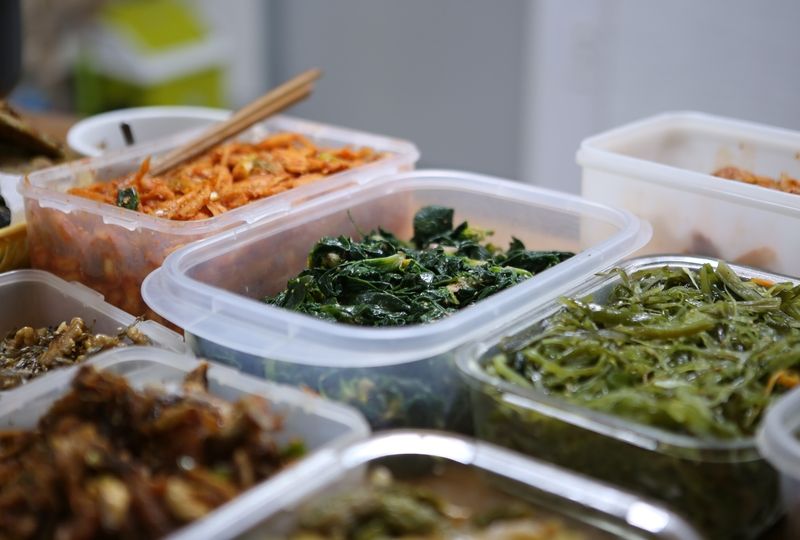
Miscellaneous
- Geon-be! (건배!): Cheers!
- A-ya! (아야!): Ouch!
- Jo-ah-yo. (좋아요): Good/I like it.
- An jo-ah-yo. (안 좋아요): Bad.
- Sel-ka (셀카): Selfie
- Seo-bis-eau (서비스): Service. This refers to a free item at a restuarant or store.
- Hwa-i-ting! (화이팅!): You can do it! Fighting!
- Meong meong (멍멍): This is the sound of a dog barking in Korean. Cute, right?
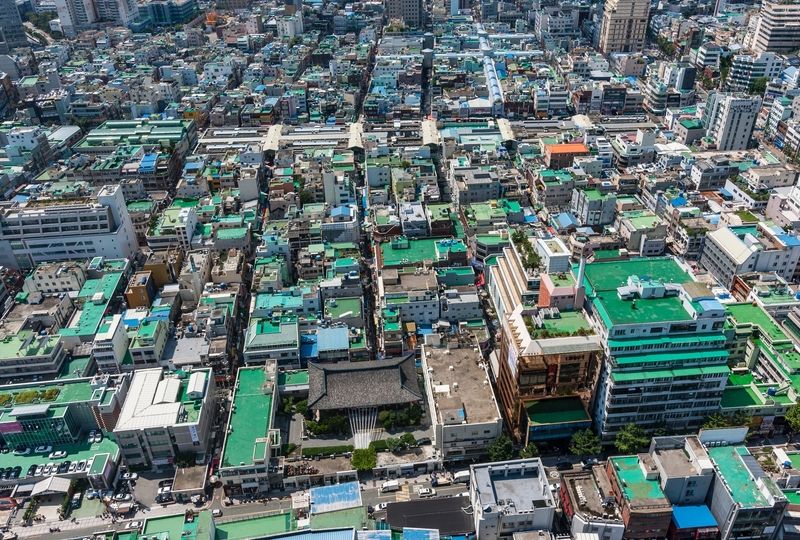
Practice Makes Perfect
While these words look simple on paper, you might want to practice speaking them outloud to make sure your pronunciation is perfect. Lucky for you, Speechling coaches are here to help. Try Speechling's Freestyle Mode! You can input and listen to any Korean traveling phrase, then record your own pronunciation. Speechling's dedicated coaches will give you personalized feedback. Your pronunciation will be like a native speaker's in no time at all!